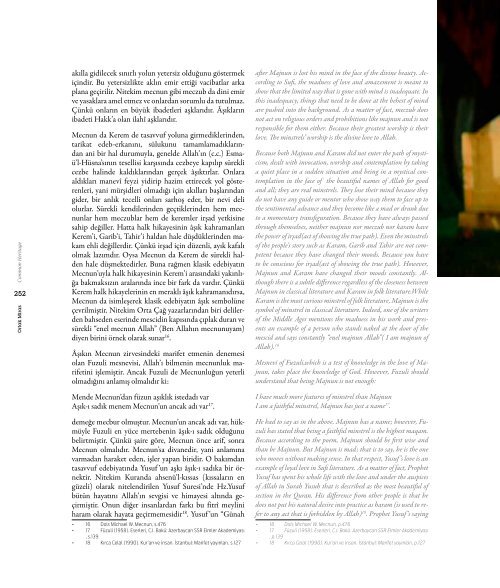Create successful ePaper yourself
Turn your PDF publications into a flip-book with our unique Google optimized e-Paper software.
Common Heritage<br />
252<br />
Ortak Miras<br />
akılla gidilecek sınırlı yolun yetersiz olduğunu göstermek<br />
içindir. Bu yetersizlikte aklın emir ettiği vacibatlar arka<br />
plana geçirilir. Nitekim mecnun gibi meczub da dini emir<br />
ve yasaklara amel etmez ve onlardan sorumlu da tutulmaz.<br />
Çünkü onların en büyük ibadetleri aşklarıdır. Âşıkların<br />
ibadeti Hakk’a olan ilahî aşklarıdır.<br />
Mecnun da Kerem de tasavvuf yoluna girmediklerinden,<br />
tarikat edeb-erkanını, sülukunu tamamlamadıklarından<br />
ani bir hal durumuyla, genelde Allah’ın (c.c.) Esmaü’l-Hüsna’sının<br />
tesellisi karşısında cezbeye kapılıp sürekli<br />
cezbe halinde kaldıklarından gerçek âşıktırlar. Onlara<br />
aldıkları manevî feyzi yidirip hazim ettirecek yol gösterenleri,<br />
yani mürşidleri olmadığı için akılları başlarından<br />
gider, bir anlık tecelli onları sarhoş eder, bir nevi deli<br />
olurlar. Sürekli kendilerinden geçtiklerinden hem mecnunlar<br />
hem meczublar hem de keremler irşad yetkisine<br />
sahip değiller. Hatta halk hikayesinin âşık kahramanları<br />
Kerem’i, Garib’i, Tahir’i haldan hale düşdüklerinden makam<br />
ehli değillerdir. Çünkü irşad için düzenli, ayık kafalı<br />
olmak lazımdır. Oysa Mecnun da Kerem de sürekli halden<br />
hale düşmektedirler. Buna rağmen klasik edebiyatın<br />
Mecnun’uyla halk hikayesinin Kerem’i arasındaki yakınlığa<br />
bakmaksızın aralarında ince bir fark da vardır. Çünkü<br />
Kerem halk hikayelerinin en meraklı âşık kahramanıdırsa,<br />
Mecnun da isimleşerek klasik edebiyatın âşık sembolüne<br />
çevrilmiştir. Nitekim Orta Çağ yazarlarından biri delilerden<br />
bahseden eserinde mescidin kapısında çıplak duran ve<br />
sürekli “enel mecnun Allah” (Ben Allahın mecnunuyam)<br />
diyen birini örnek olarak sunar 16 .<br />
Âşıkın Mecnun zirvesindeki marifet etmenin denemesi<br />
olan Fuzuli mesnevisi, Allah’ı bilmenin mecnunluk marifetini<br />
işlemiştir. Ancak Fuzuli de Mecnunluğun yeterli<br />
olmadığını anlamış olmalıdır ki:<br />
Mende Mecnun’dan füzun aşıklık istedadı var<br />
Aşık-ı sadık menem Mecnun’un ancak adı var 17 .<br />
demeğe mecbur olmuştur. Mecnun’un ancak adı var, hükmüyle<br />
Fuzuli en yüce mertebenin âşık-ı sadık olduğunu<br />
belirtmiştir. Çünkü şaire göre, Mecnun önce arif, sonra<br />
Mecnun olmalıdır. Mecnun’sa divanedir, yani anlamına<br />
varmadan haraket eden, işler yapan biridir. O bakımdan<br />
tasavvuf edebiyatında Yusuf ’un aşkı âşık-ı sadıka bir örnektir.<br />
Nitekim Kuranda ahsenü’l-kıssas (kıssaların en<br />
güzeli) olarak nitelendirilen Yusuf Suresi’nde Hz.Yusuf<br />
bütün hayatını Allah’ın sevgisi ve himayesi altında geçirmiştir.<br />
Onun diğer insanlardan farkı bu fitrî meylini<br />
haram olarak hayata geçirmemesidir 18 . Yusuf ’un “Günah<br />
• 16 Dols Michael W. Mecnun, s.476<br />
• 17 Füzuli (1958). Eserleri, C.I. Bakü: Azerbaycan SSR Elmler Akademiyası<br />
, s.139<br />
• 18 Kırca Celal (1990). Kur’an ve insan. İstanbul: Marifet yayınları, s.127<br />
after Majnun is lost his mind in the face of the divine beauty. According<br />
to Sufi, the madness of love and amazement is meant to<br />
show that the limited way that is gone with mind is inadequate. In<br />
this inadequacy, things that need to be done at the behest of mind<br />
are pushed into the background. As a matter of fact, meczub does<br />
not act on religious orders and prohibitions like majnun and is not<br />
responsible for them either. Because their greatest worship is their<br />
love. The minstrels’ worship is the divine love to Allah.<br />
Because both Majnun and Karam did not enter the path of mysticism,<br />
dealt with invocation, worship and contemplation by taking<br />
a quiet place in a sudden situation and being in a mystical contemplation<br />
in the face of the beautiful names of Allah for good<br />
and all; they are real minstrels. They lose their mind because they<br />
do not have any guide or mentor who show way them to face up to<br />
the sentimental advance and they become like a mad or drunk due<br />
to a momentary transfiguration. Because they have always passed<br />
through themselves, neither majnun nor meczub nor karam have<br />
the power of irşad(act of showing the true path). Even the minstrels<br />
of the people’s story such as Karam, Garib and Tahir are not competent<br />
because they have changed their moods. Because you have<br />
to be conscious for irşad(act of showing the true path). However,<br />
Majnun and Karam have changed their moods constantly. Although<br />
there is a subtle difference regardless of the closeness between<br />
Majnun in classical literature and Karam in folk literature.While<br />
Karam is the most curious minstrel of folk literature, Majnun is the<br />
symbol of minstrel in classical literature. Indeed, one of the writers<br />
of the Middle Ages mentions the madness in his work and presents<br />
an example of a person who stands naked at the door of the<br />
mescid and says constantly “enel majnun Allah”( I am majnun of<br />
Allah). 16<br />
Mesnevi of Fuzuli,which is a test of knowledge in the love of Majnun,<br />
takes place the knowledge of God. However, Fuzuli should<br />
understand that being Majnun is not enough:<br />
I have much more features of minstrel than Majnun<br />
I am a faithful minstrel, Majnun has just a name 17 .<br />
He had to say as in the above. Majnun has a name; however, Fuzuli<br />
has stated that being a faithful minstrel is the highest maqam.<br />
Because according to the poem, Majnun should be first wise and<br />
than be Majnun. But Majnun is mad; that is to say, he is the one<br />
who moves without making sense. In that respect, Yusuf ’s love is an<br />
example of loyal love in Sufi literature. As a matter of fact, Prophet<br />
Yusuf has spent his whole life with the love and under the auspices<br />
of Allah in Surah Yusuh that is described as the most beautiful of<br />
section in the Quran. His difference from other people is that he<br />
does not put his natural desire into practice as haram (is used to refer<br />
to any act that is forbidden by Allah) 18 . Prophet Yusuf ’s saying<br />
• 16 Dols Michael W. Mecnun, p.476<br />
• 17 Füzuli (1958). Eserleri, C.I. Bakü: Azerbaycan SSR Elmler Akademiyası<br />
, p.139<br />
• 18 Kırca Celal (1990). Kur’an ve insan. İstanbul: Marifet yayınları, p.127
















